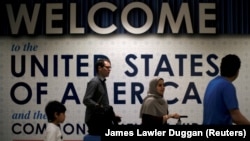US President Donald Trump on June 4 signed a proclamation resurrecting the travel ban from his first term, ordering a new ban on citizens of 12 countries, including Afghanistan and Iran, from entering the United States.
Trump said the travel ban is necessary to protect Americans from terrorist attacks such as a June 1 attack in Colorado in which authorities say a group of people demonstrating in support of Israeli hostages held by Hamas was attacked by an Egyptian national.
"The recent terror attack in Boulder, Colorado, has underscored the extreme dangers posed to our country by the entry of foreign nationals who are not properly vetted, as well as those who come here as temporary visitors and overstay their visas. We don't want them," Trump said in a video message.
The suspect in the Colorado attack, Mohammed Sabry Soliman, threw fire bombs and sprayed burning gasoline at the group, according to police. Fifteen people were injured. US Homeland Security officials said Soliman was in the country illegally after overstaying a tourist visa.
Trump compared the new travel ban to the "powerful travel restrictions" he imposed on a number of mainly Muslim countries in 2017 shortly after his first term began. He described that action as one of the most successful policies of his first term and a key part of preventing major foreign terrorism attacks on US soil, citing terrorism attacks that occurred in Europe in recent years.
"We will not let what happened in Europe happen in America," Trump said. "We cannot have open migration from any country where we cannot safely and reliably vet and screen."
In addition to Afghanistan and Iran, the countries on the new travel ban are Burma, Chad, Republic of Congo, Equatorial Guinea, Eritrea, Haiti, Libya, Somalia, Sudan, and Yemen. The ban takes effect at 12:01 a.m. Washington time on June 9.
Though the restriction does not effect travelers from Egypt, Trump said in "light of recent events" he ordered the secretary of state to update him on the review of the practices and procedures of Egypt "to confirm the adequacy of its current screening and vetting capabilities."
In addition to the ban, there will be heightened restrictions on visitors from Burundi, Cuba, Laos, Sierra Leone, Togo, Turkmenistan, and Venezuela, the proclamation said.
Trump said he remains "committed to engaging with those countries willing to cooperate to improve information sharing and identity management procedures, and to address both terrorism-related and public safety risks."
The travel ban issued during his first term banned citizens of seven predominantly Muslim countries -- Iraq, Syria, Iran, Sudan, Libya, Somalia, and Yemen. It resulted in chaos and confusion at airports in those countries and at US airports as travelers were either barred from boarding their flights to the United States or detained once they arrived.
The travelers affected included students and faculty as well as professionals, tourists, and people visiting friends and loved ones.
Trump defended the ban on national security grounds, arguing it was not based on anti-Muslim bias. It was revised amid legal challenges until a version was upheld by the Supreme Court in 2018.
The new travel ban follows an executive order Trump issued in January requiring the departments of State and Homeland Security and the Director of National Intelligence to compile a report on "hostile attitudes" toward the United States. The executive order also asked for an assessment of whether entry from certain countries represented a national security risk.












